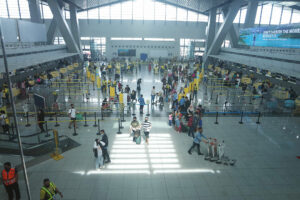PHL told to boost hotel supply with expected rush of foreign tourists
THE PHILIPPINES should boost its hotel supply to accommodate an expected influx of foreign tourists after a law was passed letting them apply for a value-added tax (VAT) refund on certain purchases, a Cabinet council said on Thursday.

By Justine Irish D. Tabile, Reporter
THE PHILIPPINES should boost its hotel supply to accommodate an expected influx of foreign tourists after a law was passed letting them apply for a value-added tax (VAT) refund on certain purchases, a Cabinet council said on Thursday.
In a statement, the Private Sector Advisory Council (PSAC) said the law, which offers VAT refunds to foreign tourists with at least P3,000 ($51) in local purchases from accredited stores, could “stimulate tourism spending, promote Filipino craftsmanship and position the Philippines as a premier global destination.”
The measure is expected to boost tourism spending by 30% and create opportunities for micro, small and medium enterprises that sell local products.
Roberto S. Claudio, a member of the council’s tourism sector, said that the law would help uplift local industries.
“This initiative not only aligns with global best practices but also highlights the unique creativity and entrepreneurial spirit of Filipino artisans,” he said. “It fosters sustainable growth, while promoting our diverse products to the world.”
But the council noted that the country should match the hotel capacity of neighboring countries to complement the VAT refund program.
“Expanding the Philippines’ hotel capacity is crucial for attracting more tourists and ensuring they experience world-class accommodations,” Lourdes Josephine Gotianun-Yap, PSAC’s tourism sector member and vice chairperson of Filinvest Development Corp., said in the statement.
She added that the recently enacted Corporate Recovery and Tax Incentives for Enterprises to Maximize Opportunities for Reinvigorating the Economy Act could encourage hotel expansions and renovations.
The council further noted that allowing income tax holidays for businesses that start generating income and a 50% deduction for reinvestments from taxable income would also help.
“PSAC is also advocating for tourism to be classified under Tier III incentives, granting six to seven years of income tax holiday for hotel development projects,” it said.
The council said their recommendations would help the Department of Tourism (DoT) hit its target of more than 445,000 hotel rooms by 2028.
“PSAC continues to collaborate with the DoT, Tourism Infrastructure and Enterprise Zone Authority and Board of Investments to revise the Strategic Investment Priority Plan and drive impactful reforms that benefit the tourism industry and local communities alike,” it added.
Joey Roi H. Bondoc, research director at property consultant Colliers Philippines, said the VAT refund program is a positive development for the Philippines tourism industry.
“It is a plus, especially because we want to attract the high-spending, long-haul foreign tourists,” he told BusinessWorld by telephone. “We want them to stay here longer and spend more.”
He cited the need for one-stop shop for VAT refunds, such as a VAT refund center in every international airport.
He added that if the Philippines breaches eight million foreign tourist arrivals next year, the country would need to raise its hotel room count. “At more than eight million, we will probably reach an occupancy rate of more than 70%, so raising our hotel room count is also crucial.”
He said that the country must improve foreign hotel brand penetration, now at 40%, to bring hotel fees lower.
“More supply will eventually result in lower hotel rates and will attract more tourists here, and that should be complemented by the VAT refund for foreign visitors,” he added.
Mr. Bondoc said the government should offer more incentives to foreign hotel operators. “What is interesting is that we’re now on the radar of these foreign hotel operators for hotels or even the condo hotels,” he said.
“So, it is important that we improve not just our infrastructure, our airports, but also the regulatory framework, meaning we provide more tax incentives because we want to make sure that we send a signal that the Philippines is open for business for these foreign hotel operators,” he added.























